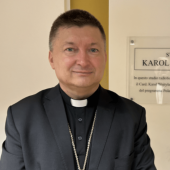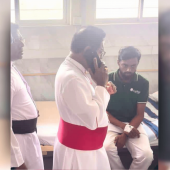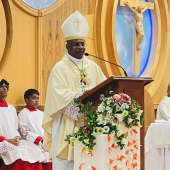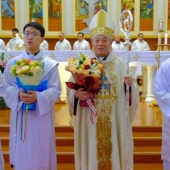Sri Lanka's prophetic Church on the side of a suffering people
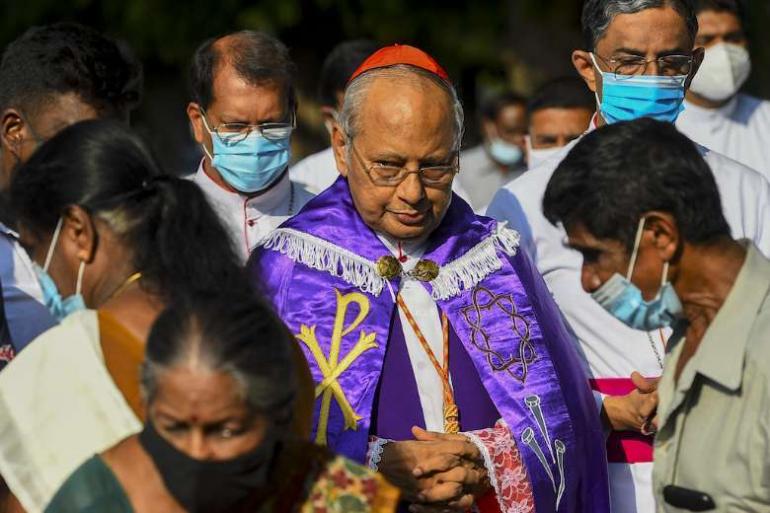
The Catholic Church in Sri Lanka appeals for the intervention of the International Community as the nation defaults on debt for the first time in its history and the people call for political change.
A steady downward spiral of economic and socio-political woes compounded by corruption and economic mismanagement at government level have severely impacted the lives and livelihoods of the people of Sri Lanka who find themselves facing a daily struggle to feed their families and to look ahead with hope.
Authorities have suspended sales of fuel for non-essential vehicles as the nation faces its worst economic crisis in decades. Schools in urban areas have shut and officials have told the country's 22 million residents to work from home.
The South Asian nation is in talks over a bailout deal as it struggles to pay for imports such as fuel and food.
Cardinal Malcolm Ranjith of Colombo has appealed to the international community to assist in providing medicines and equipment for hospitals amid its unprecedented economic crisis.
Speaking last Sunday, Cardinal Ranjith said “We urge Pope Francis to request the international community to assist Sri Lanka” and he reiterated his condemnation of widespread government corruption that he blames for having emptied the coffers of the state, depriving Sri Lankan children of a future.
Speaking to Vatican Radio, Sri Lankan Father Shanil Jayawardena, Director of Communications for his Congregation of the Missionary Oblates of Mary Immaculate at its General House in Rome, said everyday life for ordinary people in Sri Lanka has become “hell”. He also spoke of how the Church is helping provide food to those who can no longer afford to feed themselves, and of how his faith in God and his trust in the resilience of his nation keep hope alive.
When I asked Father Shanil to describe life today for ordinary Sri Lankans, he said “it is almost like going through hell.”
He explained that the shortages of of food, essential goods, medicine and the lack of fuel cause huge difficulties for ordinary citizens, for farmers and for all those involved in providing services as well.
The nation’s worst crisis ever
He described the current crisis as the worst experienced in Sri Lanka since its independence in 1948.
Father Shanil reflected on the fact that his country went through a decades-long civil war that lasted until 2009 noting that the country has suffered many difficulties. But this economic crisis, brought on by political mismanagement and corruption he said, has caused the greatest difficulties he has ever witnessed.
He told me the situation is so bad, the government has asked civil servants to stay home one day a week so that they can grow their own food.
“That's how serious it is!” And not only: this situation has resulted in unprecedented levels of inflation; the near depletion of foreign exchange reserves; a shortage of fuel and cooking gas that means people wait in queues for hours and hours just to receive a tank of cooking gas; continuous power cuts.
Of course, Father Shanil continued, all this means that it's the poor people who cannot do anything but try to live hand-to-mouth as no one is offering employment.
The Oblate explained that many people have taken to the streets to peacefully protest but the government is not listening.
Political chaos and corruption
Narrating an incredible parable of incompetence and nepotism, Fr. Shanil told me that the Prime Minister, who was the ex-President stepped down because of pressure from the people. But the President is still in power. Meanwhile, the Prime Minister – who is the President’s elder brother - had to resign following brutal attacks by security forces on peaceful protesters in Colombo.
“That led to a lot of pressure from other parties and probably even internationally for him to step down. But that did not solve matters.” In fact, he added, even since an opposition leader from another party (who was also a former Prime Minister), Mr. Ranil Wickremesinghe became the new Prime Minister and promised a lot of good things, “Nothing has changed.”
Fr. Shanil pinpointed deeply rooted corruption at the roots of the political incompetence that has poisoned the system in which politicians in Sri Lanka have repeatedly pocketed public money and mismanaged state funds.
2019 Easter Sunday bombings
It is not possible to analyse the current situation in Sri Lanka without taking into account the tragic 2019 Easter Sunday bombings in which some 270 people were killed and about 500 injured as 3 churches and 3 hotels were hit in a series of coordinated Islamist terrorist suicide attacks.
Since then, investigations have faltered. The people and the leaders of all of the country’s faith communities have demanded clarity and justice in vain. One courageous and outspoken voice calling for accountability is that of the Catholic Cardinal of Colombo, Malcolm Ranjith, who has alleged that the government has been covering up the investigations into the attacks in order to protect the brains behind them.
Fr. Shanil said there is much disillusionment and lack of trust as more than three years from the attacks “none of the main culprits have been taken into custody.”
What everyone knows, he said, is that “there was a political hand to it. We know that there was invisible power behind the scene, behind the curtain, which was never revealed. And that is why we say the truth, the real truth will never come out.”
A prophetic Church
Fr. Shanil recalled, with gratitude, Cardinal Ranjith’s latest appeal for international aid to help the people of Sri Lanka, especially by providing essential medicines.
And he told me that “at the ground root level, there are many priests and religious who have organized a lot of programmes to help, especially the poor people, to provide them with daily food.”
The Church is active in helping people get by, he continued, “but even the Church is helpless when it comes to the real problem, which is an economic crisis that the State has to solve together with the people who are protesting against the government.”
The Oblate reflected on how the Catholic Church “has been very prophetic over the last few years, especially after the Easter Sunday attacks.”
“And we have always done our best, up to this point, as Church, but it is not enough. We have to do more. We have to organize ourselves more,” he said.
Interreligious harmony
Fr. Ranjith also spoke of the good and fruitful interreligious dialogue and relations in his country.
Paradoxically, he explained, the Easter Sunday attacks have promoted harmony and collaboration between all the religious leaders – Catholics, Muslims, Hindus, Buddhists – who have been working together to help bring to justice all the culprits of the attacks.
There have been some clashes over the years, he said, especially between the Muslims and some extremist Buddhist leaders, but since the Easter attacks, the relationship has been good and it's improving.
Giving hope to the people
I asked Fr. Shanil what he hopes for his country. “We as the Catholic Church, we do our best to give hope to the people, because once you lose hope, that's the end of the story,” he said.
This is what we have been working on a lot over the last few months, he continued, trying to give hope to people “not only in providing things for them, but also bring them back to faith.”
“But I believe,” he concluded, “that if we come together as a nation, if we come together as the people of Sri Lanka, in spite of our differences, in spite of our religious and racial differences, we can defeat these corrupt politicians and we can show the world that we can rise up once again as a nation. - Vatican News
Radio Veritas Asia (RVA), a media platform of the Catholic Church, aims to share Christ. RVA started in 1969 as a continental Catholic radio station to serve Asian countries in their respective local language, thus earning the tag “the Voice of Asian Christianity.” Responding to the emerging context, RVA embraced media platforms to connect with the global Asian audience via its 21 language websites and various social media platforms.









